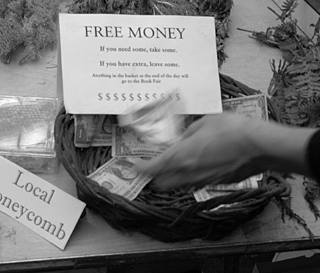| | 
- 19 March 2001
- A 747 in the Pines
- MinimalAir is a cheap but dangerous airline. In 1997, a pork byproducts saleswoman from Topeka, Kansas starved to death on a flight from Kansas City to Caracas. And in 1999, an elderly couple from Muskegon, Michigan perished from dehydration on a flight to Seoul.
Mindful of such aerial privations, I visited the Rich Bastards Club at Seattle’s Seatac airport to stock up on apples and beer before taking a MinimalAir flight back to San Francisco. I was surprised to see that the interior designers put up a couple of fake, scraggly pine trees to give the lounge an arboraceous atmosphere, but it didn’t work. Even a half a dozen giant redwoods couldn’t hide a 747. 
- 20 March 2001
- DNA Mission
- I was walking down Mission Street when an Asian man said something that sounded like, “Benjou shenwoo lenshoo.” (I’m probably misquoting him.) He then pointed to my feet, and I realized he was telling me that my shoelaces were untied.
I didn’t have the time to explain that I never tie the laces on my boots. Having worked on a number of lucrative undercover projects over the years, I have yet to discover a more efficacious way of literally trolling for DNA and other molecular evidence without being detected. Unfortunately, I had no idea of how to say “I have yet to discover a more efficacious way of literally trolling for DNA and other molecular evidence without being detected” in whatever language the gentleman was speaking. I smiled, pretended to tie my shoelaces, then continued on my mission. 
- 21 March 2001
- My New Noun, Mindless
- I was telling friends a story about some other idiot, when I found myself in an uncomfortably familiar situation: I was at a loss for words.
“He was a mindless ...” I began, “A mindless ... a mindless ... a mindless ...” “And that’s what he was,” I said after I finally found my verbal feet, “he was a mindless!” And that’s how I invented the new noun, “mindless.” 
- 22 March 2001
- They’re All Dead
- I had an exceptional time at The Museum of Twentieth Century Culture today. I didn’t particularly enjoy any of the exhibitions, but I was fascinated by two elderly visitors I followed through the galleries.
“He’s dead now,” the old man proclaimed as he pointed at portrait August Sanders made in the 1930s. “All of them must have died years ago,” the old woman said as she stood before a painting of a couple of families enjoying a bucolic picnic. The man nodded in assent. The couple walked on, then stopped before a photograph of a Polynesian couple next to an American sailor. I’d guess the photograph was made around the middle of the last century. “I’d say they’re all dead by now,” opined the old man. “Yes, almost certainly,” the old woman agreed. The couple continued to pronounce people dead for the forty-five minutes I followed them. I wonder what it’s like to be very old? I suppose I’ll find out soon enough. And if I don’t, then it doesn’t matter. 
- 23 March 2001
- David Fraser McTaggart, 1932-2001
- David McTaggart died today, so it looks like it’s time to remember another old guy who’s not around any more. One minute you’re zipping down an Italian road, then you smash head on into another car, then you’re gone. That’s the way it goes. Or at least that’s the way David went.
I never really knew David that well, even though I ostensibly worked with him for a number of years during the early days of Greenpeace. David was my first encounter with a charismatic, enlightened despot. I always respected him, even though we frequently disagreed. Usually, though, David pulled the strings of his puppets, so I didn’t have much direct interaction. I left Greenpeace a decade and a half ago when I couldn’t stand dealing with some of the incompetent twits allegedly running the organization and their vicious petty politics. (Why were Greenpeace politics so vicious? Because the stakes were so low.) I went to Greenpeace’s Internet site to see what the apparatchiks had to say about the demise of the man pulling the levers behind the curtain. I saw a hyperlink that suggested, “Click here for a testimonial to David McTaggart,” so I did. There, I read an unsigned piece that contained the following “testimonial.” Some of his closest colleagues will still describe him as a cold hearted [sic] bastard, and when David retired from active leadership of the organisation in 1991, there were those who breathed a sigh of relief.
- How very Greenpeace, to anonymously trash a dead colleague while the body’s still warm.
It’s sad to realize that David will never again buy me another drink. And it’s also sad, but not surprising, to realize that when Greenpeace is behind you, it’s inadvisable to bend over. 

- 24 March 2001
- Free Money Tests
- When I visited the San Francisco Anarchist Book Fair today, the first thing I noticed was the sign announcing the “speakers schedual.” I suppose I have to agree with Robert Frost, “You can be a little ungrammatical if you come from the right part of the country.” On the other hand, I’m not at all sure whether the anarchists, would-be anarchists, and pseudo-anarchists I saw really were from the right part of the country.
I didn’t find much in the way of art; I mostly saw lots of political tracts utilizing incredibly poor graphic design. And then there was the free money basket. I saw a small, wicker basket with perhaps twenty dollars in it. A sign on the basket announced, FREE MONEY
If you need some, take some.
If you have extra, leave some.Everyone seemed to ignore the basket, until I tried to photograph it. That’s when a woman stuck her hand in front of the camera as she dropped another dollar on the small pile. It was just another case of the camera causing something to happen. I guess all the anarchists, would-be anarchists, and pseudo-anarchists were too self-conscious to take or leave money. Or perhaps they were as confused as I was. Even now, I still can’t figure out whether I need more money or if I have extra money. When it comes to performance art and money, I always remember Abbie Hoffman throwing dollar bills onto the floor of the New York Stock Exchange thirty years ago. The stockbrokers stampeded, forcing a temporary halt in trading. Loveliness! As for the San Francisco Anarchist Book Fair, it wasn’t a waste, though, if only because I saw a poster proclaiming, “The television will not be revolutionized.” 
- 25 March 2001
- Ned on Ned
- Donna introduced me to her friend Ned at her party last night. It turns out that she’d told Ned about my notebook, so Ned came prepared to meet me.
“It must be difficult to come up with something to say every day, isn’t it?” asked Ned. “It used to be,” I agreed, “until I read Mary Heaton Vorse’s observation, ‘The art of writing is the art of applying the seat of the pants to the seat of the chair.’ After I learned that, the rest was easy.” Ned looked disappointed. “I would have thought it was more difficult than that,” he replied. “That’s why I took the liberty of writing this.” Ned handed me a small envelope, then avoided me for the rest of the evening. He seemed a little embarrassed. It would appear Ned had good reason to be embarrassed; here’s what I found in the envelope this morning. Dear David,Since I know how busy you must be, I took the liberty of writing a rough draft of today’s entry for you. Feel free to use any or all of it. 24 March 2001 Meeting Ned I got lucky at the party tonight. I didn’t get lucky with Donna, I got lucky with Ned, but not in that way at all. Ned’s a really interesting guy. He’s a very successful businessman, and from all appearances a good-looking hit with the ladies too. He told me lots of stories about his global travels around the world to various countries, and took me for a ride in his Porsche. I never knew that the new ones could go that fast! Ned and I had a great time; I’m looking forward to hearing more about his tales.
- Thanks, Ned! I like the idea of people writing my notebook entries for me; that provides more time for slothful pursuits. I wonder if he really did have a Porsche? Even a pretentious sports car would have been preferable to taking the bus back to the lab at midnight.

last weak | index | next weak
©2001 David Glenn Rinehart
| |

